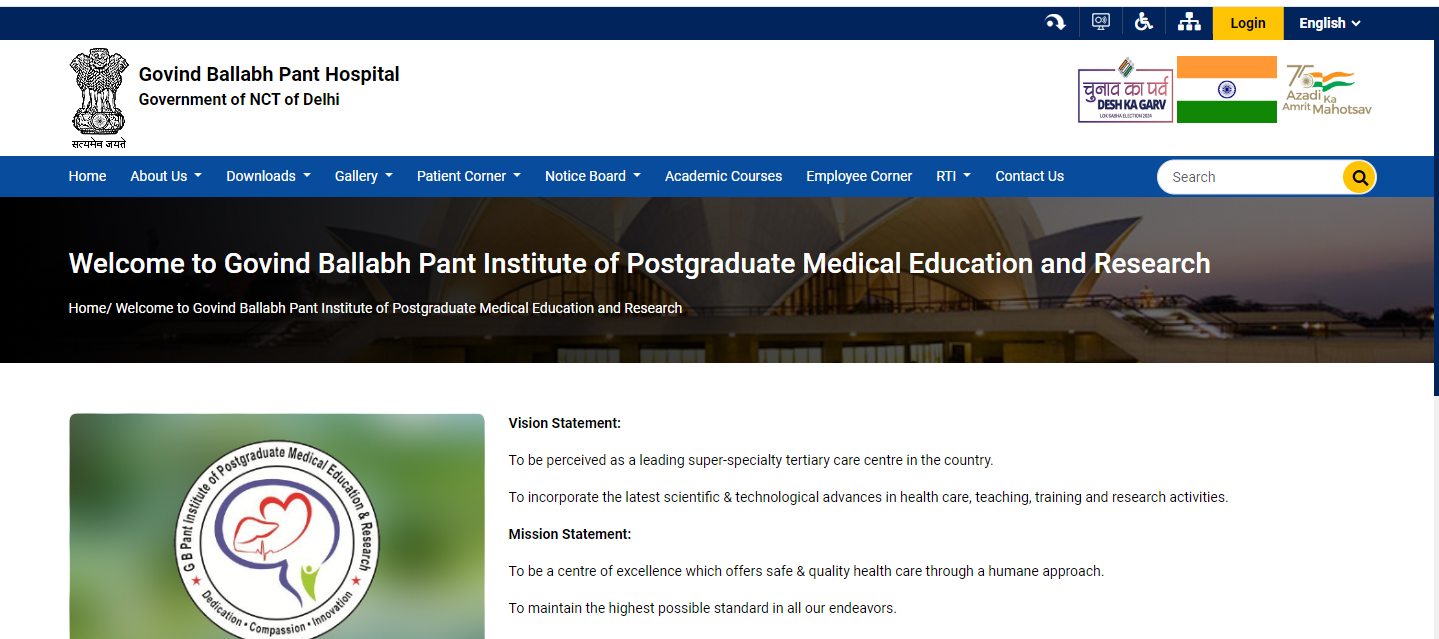
G.B. Pant Institute of Postgraduate Medical Education and Research, New Delhi
Vision Statement:
To be perceived as a leading super-specialty tertiary care centre in the country.
To incorporate the latest scientific & technological advances in health care, teaching, training and research activities.
Mission Statement:
To be a centre of excellence which offers safe & quality health care through a humane approach.
To maintain the highest possible standard in all our endeavors.
DM - Cardiac-Anaesthesia
D. M. in Cardiac Anesthesia is a doctoral program. DM Cardiac Anaesthesia course is designed to train candidates in the principles and practice of Cardiac anesthesia and intensive care and also to function as faculty/consultant in Cardiac anesthesia along with perioperative, intensive care and pain management.
Aim and Objectives of the Course
The aim of the course is to impart thorough and comprehensive training to the candidate in the various aspects of this specialty to enable him/her
- To function as a member of faculty/consultant in the specialty
- To carry out and to help in conducting applied research in the field of cardiac anesthesia
- To plan and to set-up independent cardiac anaesthesia unit catering to cardiothoracic vascular surgery and intensive cardiac care and Cath Lab.
Teaching Methods
During the period of training candidates follow in-service rotation residency programme. He/She works as senior resident and is given gradually increasing responsibility of independently managing simple cardiac operations, decision making in intensive care management, Cath Lab investigative procedures and various intensive monitoring. The day-to-day work of the trainees will be supervised by the consultant of the department of cardiac anesthesiology. The posting is so designed that the trainee gets posted in various areas of the department, including operation theatre, postoperative ICU, Intensive coronary care unit, Cath. Lab, echo room, and cardiothoracic surgery department. Purpose of rotation in Cardiac Surgery is to understand overall patient management and to develop and improve perspective on Cardiac Anaesthesia Services. He or she will be learning invasive cardiovascular diagnostic and therapeutic procedures done in Cath Lab and emergency services from viewpoint of Cardiac Anaesthesia. The Trainee will participate in regular Joint preoperative Meetings and discussions with Cardiac Surgeons, Cardiologists, Pediatricians, Physiotherapists, Nurses and Physicians for better patient management. Besides this a programme for invasive monitoring demonstrations, seminars, workshops, journal club will also be organized. In addition, soft skills: working in team, communication skills, leadership skills, ethics, techniques of documentation and knowledge of medico legal aspects will also be required to develop.
DM - Cardiology
જી.બી. પંત ઇન્સ્ટિટ્યૂટ ઓફ પોસ્ટ ગ્રેજ્યુએટ મેડિકલ એજ્યુકેશન એન્ડ રિસર્ચ, નવી દિલ્હી
It seems like you're using "DM" in the context of Cardiology. If you mean "DM" as a specific topic or abbreviation, it would be helpful to have more information or context to provide a more accurate response. "DM" could stand for various things depending on the context, such as Direct Message or Diabetes Mellitus.
If you're referring to "DM" in the context of Cardiology, and it's related to a specific topic or question, please provide more details or clarify your request so I can assist you appropriately. Whether you're interested in a particular aspect of cardiology, a specific condition, diagnostic procedures, or treatment options, additional information will help me provide more targeted information.
DM - Gastroenterology
DM - Neurology
સરકારી મેડિકલ કોલેજ, કોટા
Sure, let's talk about Neurology. Neurology is a medical specialty that focuses on the diagnosis and treatment of disorders affecting the nervous system. This includes the brain, spinal cord, peripheral nerves, and muscles. Neurologists are medical doctors who specialize in neurology. Here are some key aspects of neurology:
Neurological Disorders:
- Neurologists diagnose and treat a wide range of neurological disorders, including but not limited to:
- Stroke
- Epilepsy
- Multiple Sclerosis (MS)
- Parkinson's disease
- Alzheimer's disease
- Migraines and other headache disorders
- Neuropathies
- Movement disorders
- Neurogenetic disorders
- Neurologists diagnose and treat a wide range of neurological disorders, including but not limited to:
Neurological Examination:
- Neurologists conduct thorough neurological examinations to assess a patient's sensory function, motor skills, coordination, reflexes, and cognitive abilities.
Diagnostic Tools:
- Neuroimaging techniques such as MRI and CT scans help in visualizing the structure of the brain and spinal cord.
- Electrophysiological studies, like EEG (Electroencephalogram) and EMG (Electromyogram), assess electrical activity in the nervous system.
Stroke Management:
- Neurologists play a critical role in the management of stroke, both in acute care and long-term prevention.
Epilepsy Treatment:
- Managing epilepsy involves medication management, lifestyle adjustments, and, in some cases, surgical interventions.
Movement Disorders:
- Neurologists specialize in the diagnosis and treatment of movement disorders such as Parkinson's disease, essential tremor, and dystonia.
Headache and Pain Management:
- Addressing various types of headaches, including migraines, tension-type headaches, and cluster headaches, is a common part of neurology practice.
Memory and Cognitive Disorders:
- Neurologists evaluate and manage conditions affecting memory and cognitive function, including Alzheimer's disease and other forms of dementia.
Neuromuscular Disorders:
- Disorders affecting the muscles and peripheral nerves fall under the expertise of neurologists.
Multiple Sclerosis (MS) Management:
- Neurologists are involved in the diagnosis and long-term management of MS, an autoimmune disorder affecting the central nervous system.
Collaboration with Other Specialties:
- Neurologists often collaborate with other medical specialties, including neurosurgery, psychiatry, rheumatology, and rehabilitation medicine.
Research and Advancements:
- Neurologists contribute to ongoing research to better understand neurological conditions and develop new treatments.
Telemedicine:
- With advancements in technology, neurologists may use telemedicine for remote consultations, especially for follow-up appointments or managing chronic conditions.
If you have specific questions about neurology or if there's a particular aspect you'd like more information on, feel free to ask.
M.Ch - Neuro Surgery
M.Ch - Paediatric Surgery
M.Ch - Surgical Gastroenterology/G.I. Surgery
M.Ch - Thoracic Surgery/Cardio Thoracic Surgery/Cardio Vascular and thoracic Surgery
MD - Bio-Chemistry
MD - Microbiology
MD - Pathology
MD - Radio Diagnosis/Radiology
- Log in to post comments
- 87 views
